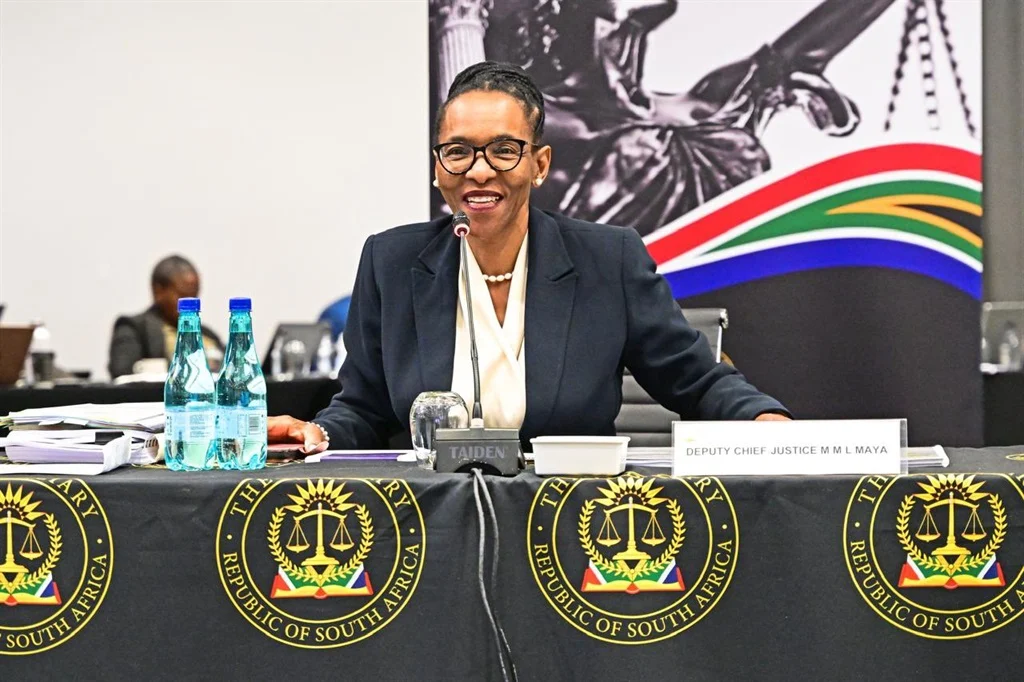
The lady in charge of South Africa’s legal future is Mandisa Maya
After the Judicial Service Commission (JSC), which is in charge of top judicial appointments, decided on Tuesday to support Mandisa Maya’s nomination as chief justice by President Cyril Ramaphosa, she will take over as head of South Africa’s judiciary for the next ten years.
Being the first woman to occupy such a role in the history of the nation, it appears to be a prize for a judge who avoided controversy.
But the position itself, along with the entire legal system, which draws from both English and Roman-Dutch jurisprudence, is becoming a source of political controversy.
Radical elements have been criticizing the political agreements reached during the 1992–1993 multi-party negotiations and the resulting constitution since they saw them as effectively legitimizing land theft and other excesses of the colonial era, as well as the apartheid system that shaped the contemporary urban landscapes of this still divided nation.
However, their voices were muffled by the overwhelming majority’s acceptance of a new agreement in the “land of apartheid,” with post-apartheid administrations left to address the prejudices ingrained in an inherited legal system.
However, some, like former president Jacob Zuma and his recently formed uMkhonto we Sizwe (MK) party, believe that the law has to be completely rewritten from the ground up.
783 counts of fraud, corruption, and money laundering against Zuma are still pending. The charges stem from alleged kickbacks during an arms sale in the late 1990s.
But he is so determined to get the negotiated constitution and South Africa’s “Eurocentric” legislation repealed that he is willing to seek a return to something like marginally modernized traditional tribal law. His name was recently removed from the ballot due to his prior behavior, which included serving a jail sentence for contempt of court.
In addition to MK, South Africa’s legal systems have been the subject of heated debates between Julius Malema and his Economic Freedom Fighters (EFF).
In addition, Malema and some of his close associates are under investigation by the law for potential state capture-style graft and other purported irregularities.
At one point, when anti-immigrant feelings were running high amid more episodes of violent xenophobia, the openly Pan-Africanist EFF was debating its own policies.
The Party contended that an excessive number of persons were being granted entry into the nation and that the standard for amnesty petitions was too low.
The EFF maintains a firm stance that, should it come to power, it will vigorously enforce both current and new laws because it believes in the centralization of power in a Marxist-Leninist state system. However, its position appears to be more closely tied to the direct effects of the law on the party leaders than any underlying ideological issues.
The EFF and MK both declare their support for nationalizing all significant sectors.
According to the most recent opinion polls, these two political groups together could receive at least a four percent of the vote in the elections that are scheduled for Wednesday of next week.
That might not pose a direct or immediate danger to the current judicial system in South Africa.
The belief that “old colonial laws and systems must go” is becoming more and more popular, despite the fact that most people who support it are unaware of the consequences.
Even though Raymond Zondo was “next in line” to become Deputy Chief Justice, President Cyril Ramaphosa made a rather “controversial” appointment when he chose the outgoing Chief Justice in April 2022.
This was because he served for four years as the chair of the commission of inquiry investigating state capture graft, which was ironically one of the last official acts of then-outgoing President Zuma before he was forced to quit in 2018 by his own ruling African National Congress (ANC) party.
Thus, as a result of Justice Maya’s ascent to prominence, she will now have to handle the political fallout from requests for a reform in the judicial system as well as any future legal disputes about the best course of action.
Mandisa Muriel Lindelwa Maya was born in March 1964 in the “black homeland” of Transkei, which is now the Eastern Cape province. She was appointed deputy chief justice of South Africa shortly after Justice Zondo won the top position in 2022.
She came from modest beginnings and went on to have a brilliant career. She served as the Supreme Court of Appeal’s president from 2017 to 2022.
She was admitted as an advocate in 1994, having previously served as a prosecutor and state law adviser.
June 2006 saw her appointed by former president Thabo Mbeki to the Supreme Court of Appeal. She was promoted to the appellate court’s President in May 2017 after being named deputy president in September 2015.
She was the first woman of color to hold a position on the Supreme Court of Appeals and the first female president and deputy president of the court.
All Categories
Recent Posts
Tags
+13162306000
zoneyetu@yahoo.com



